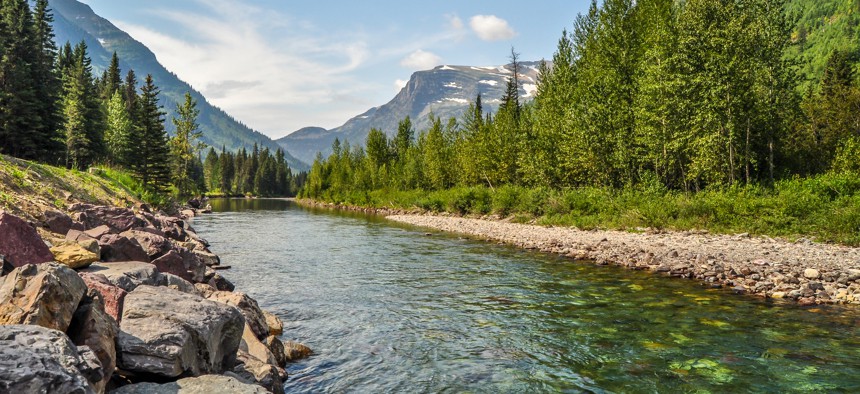EPA Announces Intent to Give Governments Back More Authority Over Clean Water Act Rule

A river running through a valley in Glacier National Park of Montana. istock.com/Matt Anderson
Last year 21 state attorneys general sued over a rule change to the act implemented by the Trump administration, saying it lessens states’ abilities to combat pollution.
The Environmental Protection Agency announced its intent to revise the 2020 Clean Water Act section 401 Certification Rule to give more authority back to state, local and tribal governments, which will have a say in the effort. The EPA will begin a stakeholder engagement process in June to hear perspectives on the topic and how to move forward.
“We have serious water challenges to address as a nation, I will not hesitate to correct decisions that weakened the authority of states and Tribes to protect their waters,” said EPA Administrator Michael S. Regan in a statement.
Last year 21 state attorneys general sued over this rule change to Clean Water Act implemented by the Trump administration, saying it lessens states’ abilities to combat pollution. Meanwhile, U.S. Republican senators have sought to rein in state power over key environmental permits.
“The prior administration’s rule was not only harmful to the environment, it was corrosive to state, federal, and Tribal partnerships,” Kate Brown, governor of Oregon, said in a statement. “We welcome this important step by the Biden-Harris Administration to restore a strong, collaborative approach to protecting one of America’s most precious resources.”
According to the announcement this week, the EPA will engage with stakeholders and develop a revised rule, but the 2020 rule will remain in place until then. The agency will continue listening to states, localities and tribes about their concerns about the implementation of the 2020 rule to evaluate potential administrative approaches to help address near-term challenges.
Regan said, “We need all state, Tribal, local, and federal partners working in collaboration to protect clean water, which underpins sustainable economic development and vibrant communities. Today, we take an important step to realize this commitment and reaffirm the authority of states and Tribes.”
President Trump also impacted other environmental rules. Federal law gives states the power to stop pipelines and coal facility projects, but the Trump administration blocked some states from using the process. However, an executive order was put in place by President Biden to implement various environmental policies—for example, revoking the permit for the Keystone XL Pipeline and temporarily prohibiting drilling in the Arctic National Wildlife Refuge.
To see more on the Clean Water Act rule and its implementation click here.
Brent Woodie is associate editor for Route Fifty.
NEXT STORY: GOP Senators Raise Infrastructure Counteroffer to $928B





